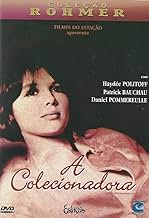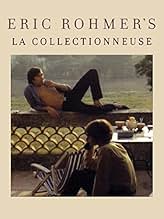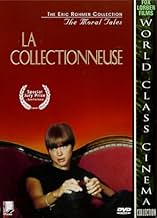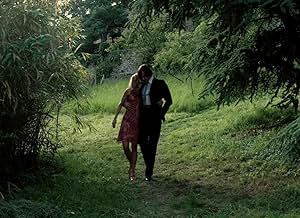IMDb रेटिंग
7.3/10
10 हज़ार
आपकी रेटिंग
अपनी भाषा में प्लॉट जोड़ेंA womanizing art dealer and a painter find the serenity of their Riviera vacation disturbed by a third guest, a vivacious bohemian woman known for her long list of male conquests.A womanizing art dealer and a painter find the serenity of their Riviera vacation disturbed by a third guest, a vivacious bohemian woman known for her long list of male conquests.A womanizing art dealer and a painter find the serenity of their Riviera vacation disturbed by a third guest, a vivacious bohemian woman known for her long list of male conquests.
- पुरस्कार
- 2 जीत और कुल 1 नामांकन
Mijanou Bardot
- Carole
- (as Mijanou)
Eugene Archer
- Sam
- (बिना क्रेडिट के)
Brian Belshaw
- Haydée's boyfriend
- (बिना क्रेडिट के)
Pierre-Richard Bré
- Homme dans l'auto
- (बिना क्रेडिट के)
Donald Cammell
- Garçon à St-Tropez
- (बिना क्रेडिट के)
Alfred de Graff
- Touriste perdu
- (बिना क्रेडिट के)
फ़ीचर्ड समीक्षाएं
10totius
It's hard to explain what is the Rohmer's cinema. In his movies you can't find heroes, incredible adventures or great action sequences. Everything happens inside the mind of the characters, and the most important aspect is the psychology of them.
La Collectioneuse is simply the masterpiece of Rohmer.
The plot is very simple: two boys and one girl in their friend's house in St.Tropez. That's all. There are not incredible events that happen, they simply LIVE there. It's an typical situation of Rohmer who likes to study the evolution of love triangles, in different situations. The explanation of the development steps, made by the usual interior voice of the main character (Adrien), it's incredibly accurate and likely. It's fantastic that sometimes Adrien's thoughts look at first to be absurd, but even in this case if we reflect a bit to that we can realize that it's true, that really in similar cases we have non-sense thoughts like those. In this way, Rohmer is unique: the psycho-evolution of the characters is incredibly real. Dialogs, internal and not, are superb and the directing essential.
Rohmer shows us how it's possible to make a masterpiece with a ridiculous budget, and how an intellectual movie can be also enjoyable and not so heavy.
The vote, of course, can't be different by 10 out of 10.
La Collectioneuse is simply the masterpiece of Rohmer.
The plot is very simple: two boys and one girl in their friend's house in St.Tropez. That's all. There are not incredible events that happen, they simply LIVE there. It's an typical situation of Rohmer who likes to study the evolution of love triangles, in different situations. The explanation of the development steps, made by the usual interior voice of the main character (Adrien), it's incredibly accurate and likely. It's fantastic that sometimes Adrien's thoughts look at first to be absurd, but even in this case if we reflect a bit to that we can realize that it's true, that really in similar cases we have non-sense thoughts like those. In this way, Rohmer is unique: the psycho-evolution of the characters is incredibly real. Dialogs, internal and not, are superb and the directing essential.
Rohmer shows us how it's possible to make a masterpiece with a ridiculous budget, and how an intellectual movie can be also enjoyable and not so heavy.
The vote, of course, can't be different by 10 out of 10.
"La Collectionneuse", the third film in Eric Rohmer's six moral tales, is packed with lacerating observations on life, love, and the nature of man. It is a sensitive conversation piece with elegant people commenting poetically on their lives and of those around them. Attractive men and women who reflect openly about the conflicts of intellect and impulse; inclination and action, solitude and companionship. Rohmer characteristically paces this eloquent tale of sexual temptation with long, fluid takes. "La Collectionneuse(Collector Girl) centers around a young, hedonistic girl(Haydee) who saunters laconically around the provincial environs of a large vacation home, seemingly indifferent to the two older men's(Adrian and Danele) existence. Haydee exudes a casual independence and an unflappable reserve. Her cursory dealings with her young lovers prompts Danele to cast her as 'the atrocious ingenue'. Though they find her unexpectedly alluring, both men regard 'the idea of collecting boyfriends opposite of purity'. Rohmer, the director of "Chloe in the Afternoon" and "A Tale of Springtime", enjoys revealing which individual can best cast their charm and guile to their best advantage. This 'game' between the sexes only leads to unwanted desires for the men and a resumption of her search by Haydee. Rohmer handles the material with a light touch throughout and concludes his story by offering a tenuous solution to the prevailing tension in the movie between one's solitude and fraternity. Adrian privately confesses that 'I was overwhelmed by a feeling of delightful independence, of total self-determination. But in the emptiness and silence of the house, I was overcome with anguish'. A universal truth clearly-rendered by one of cinema's most ingenious and graceful filmmakers.
Eric Rohmer's movies are, it seems almost without exception, slow- burners that reward those with the patience to sit through them, preferably more than once in some cases, and think about whats being said as much as whats being shown. This, his first feature in colour requires considerable thought on the part of the viewer, serving up nothing in the way of dramatic excitement and featuring three loathsome main characters who's morals are very in keeping with the era of late- 60s self satisfaction and hedonistic excess. Not that the hedonism is very wild. Jimi Hendrix does not blast from the simple record player that sits near a chair and provides the only music in the film. No one smokes anything illegal or pops any pills, talks of Indian mystics or goes in for meditation. But there is the very liberated (nowadays we'd say reckless) attitude to casual sex, although we don't see very much; the relaxed tangle of naked legs half glimpsed through one doorway, a brief an unrevealing shot of the main protagonist, the disturbingly young looking Haydee, quietly enjoying the intimate attention of another one-night-stand. Otherwise it's all hints and the more effective for that. Haydee is the very image of a swinging-sixties bed hopper. Young, slender, independent, cool and seemingly amoral she wrecks the plans of Adrian, an art dealer with time on his hands, when he finds her resident in a borrowed holiday villa at which he intends to devote himself to doing nothing at all for a few weeks while his girlfriend is in London. Haydee's noisy night-time frolics disturb his sleep and offend his self- declared sense of morality and the added presence in the house of his lazy, grumpy painter-friend Daniel sets up a spiralling tension between them all. But this is pure Rohmer and that tension manifests itself not in fist-fights, broken furniture, tearful confessions and blood-letting, but insults, low-key/nigh-brow arguments, teasing, sniping and political manoeuvring. In fact the more one thinks about the film, and it's one of those movies that does hang around long after the credits, the more one realises it's actually rather more like real-life, certainly as most of us endure it from time to time, than the over-dramatic offerings we are used to from mainstream movie-makers. Haydee maybe cute, Adrien describes himself as handsome and the setting is idyllic but you really wouldn't like to be on holiday with these unsympathetic characters. Observing their antics from without is one thing but to be part of it would be a nightmare! Oddly with it's morality so perfectly fixed in it's own time, this seems far more like a film from the 1970s. Something in it's look and after-the-party sense of deflation and disenchantment fits in with that later decade. Seeing it without knowing the release date you might well guess at 1972 or even later. If Godard's BANDE A PARTE is set in a Swinging-Sixties that hasn't yet arrived, Rohmer's film portrays one that has already left the building, although it's after-effects continue to create a problem. It all sounds somewhat depressing on paper and to some extent it is! It's not an easy film but if you give it time and maybe second look, you might well find there is more to this outwardly simple tale than you thought.
Art dealer, in need of serenity, finds that the holiday villa is shared by a hedonistic young woman. He becomes obsessed with ignoring her and pretends to himself that she wants to seduce him while he remains unaffected. The holiday thus turns into a love triangle between the indifferent but flirtatious girl, the man's unacknowledged desire, and his incessant, pompous self-rationalizations (the best cinematic use of voice-over EVER!). A sunny, witty, and deeply ironic "moral tale" that explores, like most of Rohmer's work, the uneasy vacillation between intellect and eroticism.
La Collectionneuse is a fine example how consistent Eric Rohmer was throughout his Moral Tales series. The story isn't important here, its the intensity of each scene and the tension among the characters till the last scene. Subtle jump cuts in the storyline can make you pause & arrive at your own hypotheses about how the characters are feeling in the following scenes. This is a visual treat - whether its the sights & sounds of the reviera house where most of the movie takes place, or the shots of beach or Haydee Politoff's delicious lips. You never begin to hate or love any character at any point - but they stay on your mind long after the movie is over. The characters, adrian, haydee & daniel exude human rawness - none are perfect or simplistic. As a viewer, I could not take anyone's side. They all seek power in their own ways, while exposing their sensitivies equally. Its a curious caricature of the complexities around love and life. Rohmer uses symbols like antiques to express how the relationships are built and broken. I could watch it again & again. A delightful Rohmer classic - its poetic, with a pacing that works as a meditation of sorts.
क्या आपको पता है
- ट्रिवियाÉric Rohmer's first color film.
- कनेक्शनFeatured in Uuden aallon jäljillä (2009)
टॉप पसंद
रेटिंग देने के लिए साइन-इन करें और वैयक्तिकृत सुझावों के लिए वॉचलिस्ट करें
- How long is The Collector?Alexa द्वारा संचालित
- What are the names of all six of Rohmer's moral tales?
विवरण
- रिलीज़ की तारीख़
- कंट्री ऑफ़ ओरिजिन
- आधिकारिक साइट
- भाषाएं
- इस रूप में भी जाना जाता है
- The Collector
- फ़िल्माने की जगहें
- Côte d'Azur, फ़्रांस(coastal line and landscapes)
- उत्पादन कंपनियां
- IMDbPro पर और कंपनी क्रेडिट देखें
बॉक्स ऑफ़िस
- दुनिया भर में सकल
- $7,077
- चलने की अवधि1 घंटा 26 मिनट
- ध्वनि मिश्रण
- पक्ष अनुपात
- 1.37 : 1
इस पेज में योगदान दें
किसी बदलाव का सुझाव दें या अनुपलब्ध कॉन्टेंट जोड़ें


![Bande-annonce [OV] देखें](https://m.media-amazon.com/images/M/MV5BMjA2ZGRjY2QtNmMzMy00MjE3LWI1YzUtZTZiZDQ5YzY0YWIxXkEyXkFqcGdeQXRyYW5zY29kZS13b3JrZmxvdw@@._V1_QL75_UX500_CR0)

























